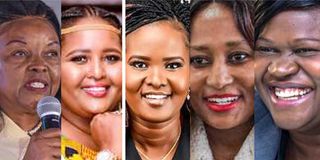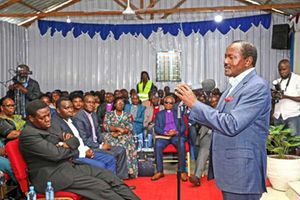We need more women leaders; that’s the reality

Machakos Senator Agnes Kavindu, Samburu West MP Naisula Lesuuda, Turkana Woman Rep Cecilia Asinyen Ngitit, Kirinyaga Woman Rep Jane Njeri Maina and Homa Bay Governor Gladys Wanga. A recent Infotrak survey rated them as top performers.
What you need to know:
- Despite the strides in women’s representation in powerful roles, many people, surprisingly, still don’t trust them to be effective leaders.
- The solution lies in giving women a chance to lead, especially in politics where national policies are made.
Two of our columnists have, in this week's edition of the Voice, made reference to The Athena, a mentorship programme that augments professional competency of women and men in leadership.
Faith Oneya and Daisy Okoti attended The Athena event held in Nairobi, last Saturday. In their articles, they quote William Alexander McDonald (Barbados High Commissioner to Kenya), a speaker at the event. Faith says the diplomat “reiterated that the world needed more confident men who were not threatened by the success of women”.
Daisy quotes him verbatim: “Evidence shows that wherever there is a confident man who is not threatened by the achievements of women, women are more likely to succeed… how do we get more confident men who are prepared to facilitate the success of women?”
My interpretation of this statement is that the world will be a better place when men take the lead in giving girls and women a chance to lead. A necessity, especially in Africa where girls rarely choose their life paths. This is perpetuated by patriarchy, leading to persistent, systemic gender inequality.
Despite the strides in women’s representation in powerful roles, many people, surprisingly, still don’t trust them to be effective leaders – biases are deep-rooted and may take a while to change. The solution lies in giving women a chance to lead, especially in politics where national policies are made. Gender diversity in political leadership fosters an inclusive society, with women enriching decision-making with unique perspectives.
Indeed, empowering women in politics is a step towards dismantling ingrained gender stereotypes and biases. As women take on these roles, they challenge preconceived notions about traditional gender roles, thus inspiring future generations to pursue their aspirations irrespective of gender.
A 2019 research by Harvard Business Review rates women better than men on key leadership capabilities. Research also shows that companies with more women on their boards outperform those without, and organisations with greater gender diversity in senior management are more profitable.
Yet, women remain underrepresented in leadership positions across sectors.
At the peak of Covid-19, female leaders in Denmark, Finland, Germany, Iceland, Norway, Taiwan and New Zealand were said to have managed the crisis better than their male counterparts. The reality is that we need more women leaders.
Although more women are vaulting to power today, the culture of distrust in them endures. The case of Meru Governor Kawira Mwangaza, who recently won an impeachment case against her, comes to mind. Though she was accused of many wrongdoings, patriarchy was at the heart of her tribulations. Like her, many women leaders have had to battle against sexist comments, even as they succeed on the political stage.
Only when we create opportunities for women will we see more leaders like Gladys Wanga, Naisula Lesuuda, Cecilia Ngitit, Jane Njeri Maina and Agnes Kavindu. A recent poll by Infotrak ranked them the best leaders in their political capacities.
My questions: while women get votes from the electorate, why don’t they also receive votes of confidence? How do we get more confident men to facilitate women’s success? Ponder that.





